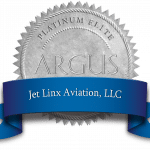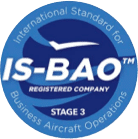The safety of our clients and our team is at the foundation of everything we do. In addition to our exceptional pilots who are all trained through FlightSafety International or CAE, Jet Linx has earned ARGUS Platinum Elite and WYVERN Wingman PRO safety ratings and is an International Business Aviation Council (IS-BAO) Stage 3 registered operator.

Jet Linx is the first operator to receive ARGUS’s new Platinum Elite safety ranking - the highest level awarded by ARGUS (Aviation Research Group US). The Platinum Elite rating is only awarded to experienced operators who have a well-developed Safety Management System (SMS), a clear and workable Emergency Response Plan, effective policies and procedures, and documented records for all major aspects of Operations and Maintenance. Jet Linx had previously maintained a Platinum rating since its first ARGUS audit in 2007.

The International Standard for Business Aircraft Operations (IS-BAO) is a code of best practices that serves as the gold standard for business aviation around the world. It was developed by the International Business Aviation Council (IBAC) in 2002 and has been endorsed by the National Business Aviation Association (NBAA). Stage 3, the most advanced level, is awarded only when safety management has become a fully engrained part of the company’s culture, and a positive culture of safety management has been sustained over time. Jet Linx has maintained a Stage 3 rating since its first Stage 3 IS-BAO audit in 2015.

Jet Linx has maintained a WYVERN Wingman rating since 2014 and has been involved in the Flight Leader Program since 2021. In 2023, Jet Linx became WYVERN Wingman PRO certified, the highest designation available from the auditing firm. This revolutionary program is designed to mitigate safety performance drift with quarterly assessments of the operation, along with recommendations from an assigned Flight Leader Program coach that brings decades of experience with industry involvement related to human, organizational, and technical factors that all contribute to a resilient safety program.
Safe operations start with smart hiring practices. Our robust process of hiring, training, and managing pilots relieves our Aircraft Management clients of the administrative duties. While giving you the ability to be involved in the hiring process by reviewing resumes, participating in interviews, and providing final approval of qualified candidates.
MINIMUM CREW REQUIREMENTS
Jet Linx has a robust Safety Management System (SMS) that is aligned with the standards of major commercial airlines that few others do! The SMS is designed for assessment and management of both planned changes and quality escapes. The SMS includes:
In 2007 we began sending our pilots through an industry-leading Crew Resource Management (CRM) training program to nurture better crew communication with the goal of creating a safer flight deck. The training includes Human Factors, Communication Skills, and Situational Awareness training.
Since 2007, we have taken it a step further by developing our own in-house CRM training program, since approved by the FAA. And because we believe so strongly in the platform, we also require team members who are an extension of the crew on the ground – our flight coordinators, Flight Concierge, maintenance technicians, and line service personnel – to attend CRM classes annually. In 2011, the FAA issued a statement making it mandatory for all companies to implement CRM training for their pilots.
Our pilots come to our National Operations Center (NOC) in person each year for two days of augmented in-person training about the most important concepts, including flight management, professionalism, human factors and threat and error management. This recurrent training contributes directly to enhanced flight safety. We only know of one other provider in our space exercising this level of care in training, with annual, face-to-face interaction and collaboration.
While our pilots are at the NOC, they spend time with our Flight Coordination team, offering a chance to immerse themselves in our processes and work collectively to improve operations.
Our National Operations Center (NOC) is staffed 24/7, monitoring and supporting operations with a dedicated team over 100 professionals. To augment this effort, we also employ an external vendor to monitor safety and security conditions at the destinations we fly to, alerting us to any issues.
We don’t compromise on standards. A risk assessment occurs for every flight. This includes factors such as airport restrictions, weather, and pilot fatigue. Pilot fatigue is also actively monitored using industry leading software, an investment made by few companies in the private aviation industry.
We don’t outsource basic aircraft maintenance. Each Base has dedicated mechanics that are highly knowledgeable about the aircraft they work on. The work they do is further reviewed by the NOC maintenance team for quality control. Other companies completely outsource all maintenance, meaning someone different is always working on the aircraft. Our dedicated maintenance control managers on duty at the NOC ensure consistent quality and airworthiness.
Our pilots, mechanics, flight followers, flight attendants, and line service/ground personnel participate in a highly successful Aviation Safety Action Program (ASAP). Very few Part 135 operators have an ASAP, much less one that has 75% of their pilots contributing. Reporting programs like ASAP foster a culture of continuous improvement. With information gathered from ASAP reports, we don’t just treat the symptom – we analyze the systems and processes and proactively make changes when warranted to prevent negative outcomes.
Jet Linx was the first airline to hold an annual, all-Company Safety Summit. At this event, we cease all retail flight operations company-wide for a day to focus on safety. Industry experts from the NTSB, the FAA, and other safety-assurance companies provide keynote addresses, and all team members are trained on Emergency Response and Safety Management. At this meeting, every team member actively signs the Company Safety Policy, reflecting their understanding, responsibilities and commitment to our safety standards.
Jet Linx hosts small focus group symposium meetings quarterly with our vendors, insurers, and other Part 135 operators to keep moving the safety standards higher for the industry as a whole. Our Director of Safety trains other executives and safety professionals in various industries by speaking at Symposium events and academic institutions. We also work actively with the National Air Transportation Association (NATA) to ensure fuel quality at our Bases and destinations, leading a Part 135 industry push to assure enhanced fuel quality standards.
The Jet Linx Safety Team is also engaged with multiple industry forums, including FAA’s Infoshare, Bombardier’s Safety Stand Down, and the General Aviation Issue Analysis Team (GA-IAT), to maintain a proactive approach to identifying industry-wide safety trends and collaborate with safety stakeholders on efficient solutions to areas that may pose a risk to any aspect of our operation.
Our private terminals are truly private, reserved for Jet Linx Members, Aircraft Owners, and their guests only. These spaces offer dedicated service in a private area, with only authorized personnel on site. Additional measures like security cameras and controlled entries ensure guest security. Most other part 135 carriers share a lobby at a Fixed Based Operator (FBO) with other unknown travelers.
Hangar space is also available at our Base locations, ensuring our aircraft are kept out of the elements. This reduces the likelihood of personal injury or aircraft damage.
While we do all we can to maintain a safety culture that will prevent safety incidents, we are committed to Company-wide preparation in case of an adverse event impacting an aircraft, our facilities, our team or our clients. Many others barely meet the minimums in this preparedness and planning.
We are constantly engaged in managing our flights and immediately provide inflight support if something is out of the ordinary on board or at a destination.
At Jet Linx, our pilots are not only trained to the highest standards of airmanship, but also assigned to a specific tail number. They know their aircraft with the familiarity and understanding that one knows their own car.
Local Service & National Reach
100+ Aircraft in Fleet
25 Years of Business
20+ Base Locations
"*" indicates required fields